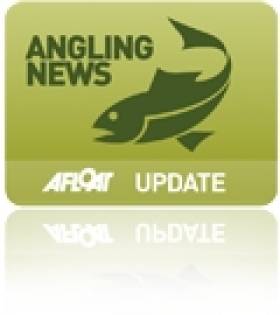Displaying items by tag: Conor Lenihan T.D
Bye-Laws for Wild Salmon Fisheries Approved
The Minister for Natural Resources, Conor Lenihan T.D., has approved a suite of regulations and bye-laws that will govern the wild salmon fishery in 2011. These will come into effect from Friday, 1 January 2011.
On receipt of management and scientific advice on the current status of Irish salmon stocks from Inland Fisheries Ireland and having considered submissions received through the public consultation exercise, the Minister of State introduced conservation measures for the management of the wild salmon and sea trout fishery in 2011.
Having signed the regulations and bye-laws the Minister remarked:
"I am cautiously optimistic about our native salmon stocks given the performance of stocks over recent years. The 2011 season will see 20 rivers which were closed in 2010 being opened because of an improvement in salmon stocks. 5 rivers which were previously closed for fishing, the Castletown, Suir, Glenamoy, Kerry Blackwater and Eske, will open with an identified surplus number of fish for harvest. 18 additional rivers will be open to angling on a "catch & release" basis."
"My caution is founded on the knowledge that 3 rivers which previously had been open will be closed on conservation grounds in 2011 (the Sheen, Screebe and Srahmore)", added the Natural Resources Minister.
In all the Standing Scientific Committee assessed 141 rivers and have advised that:-
· 52 rivers are open as a surplus of fish has been identified in these rivers (i.e. 2 more than in 2010);
· 29 rivers have been classified as open for "Catch and Release" only (i.e. 18 more than 2010 (see list below); and
· 60 rivers are closed as they have no surplus of fish available for harvest in them (i.e. 20 less than 2010).
The Minister also announced that in 2011 the cost of a one-day salmon angling licence (often used by tourist anglers) will be reduced by €12 (37.5%) on the recommendation of Inland Fisheries Ireland. "The purpose of the initiative is to give as much encouragement as possible to visiting tourist anglers to come to Ireland and experience the excellent game angling product being developed around our improving stocks" said Minister Lenihan.
With the exception of a proposed change to the number of blue (angling) tags applicable to a one-day salmon licence holder, the Wild Salmon and Sea trout Tagging Scheme Regulations for 2011 are in essence unchanged from the Regulations which were introduced following the establishment of Inland Fisheries Ireland in July, 2010. A number of minor amendments to the Regulations, recommended by Inland Fisheries Ireland, will provide for more effective administration of the tagging scheme regulations in 2011.
Summary of main changes to the management of the wild salmon fishery in 2011
19 Rivers which were closed in 2010 will open for angling on a "catch & release" basis in 2011:-
Ø Glyde (Dundalk fishery district)
Ø Slaney (Wexford fishery district) (note; river is closed until 12 May 2011)
Ø Bride (Lismore fishery district)
Ø Glengariff, Adrigole (Cork fishery district)
Ø Kealincha, Lough Fada, Behy, Owenascaul, Milltown, Feohanagh (Kerry fishery district)
Ø Grange (Sligo fishery district)
Ø Oily, Owenwee (Yellow River) (Ballyshannon fishery district)
Ø Bracky, Glenna, Tullaghobegley, Ray, Glenagannon (Letterkenny fishery district).
5 Rivers which were "catch & release" in 2010 and will open for harvest in 2011
Castletown (Dundalk fishery district)
Suir (Waterford fishery district)
Kerry Blackwater (Kerry fishery district)
Glenamoy (Bangor fishery district)
Eske (Ballyshannon fishery district)
3 Rivers which were open in 2010 will be limited to "catch & release" in 2011
Sheen (Kerry fishery district)
Screebe (Connemara fishery district)
Srahmore (Bangor fishery district).
8 Statutory instruments/Bye-Laws give effect to the decisions made by the Minister of State for management of the salmon fishery in 2011:
Wild Salmon and Sea Trout Tagging Scheme (No. 2) Regulations, 2010 provide for, among other things, the total allowable catch of fish that can be harvested by commercial fishing engines and rod and line from identified rivers.
Salmon Rod Ordinary Licences (Alteration of Licence Duties) Order 2010 and Special Tidal Waters (Special Local Licences) (Alteration of Duties) Order 2010: prescribe the licence fees payable from 1 January 2011.
Conservation of Salmon and Sea Trout (Catch and Release) Bye-law No. 873, 2010: specifies the rivers in which angling is permitted on a catch and release basis and associated conditions.
Conservation of Salmon and Sea Trout (Bag Limits) Bye-law No. 874, 2010: provides for the annual, season and daily bag limits for the 2011 season and also provides for fishing methods.
Conservation of Salmon and Sea Trout (Closed Rivers) Bye-law No. C.S. 306, 2010: prohibits angling for salmon and sea trout over 40cm in specified rivers.
The following bye-laws make provisions in relation to specific rivers:
Conservation of Salmon and Sea Trout (Newport River) Bye-law No. 875, 2010.
Conservation of Salmon and Sea Trout (River Bandon) Bye-Law No. 876, 2010.
Conservation of Salmon and Sea Trout (Garvogue River) Bye-Law No. 877, 2010





























































